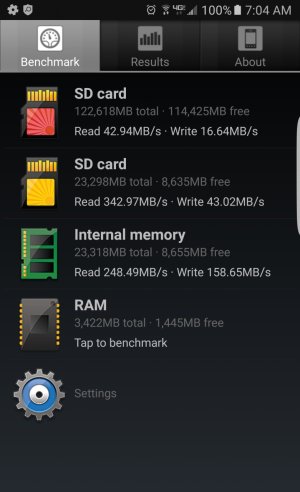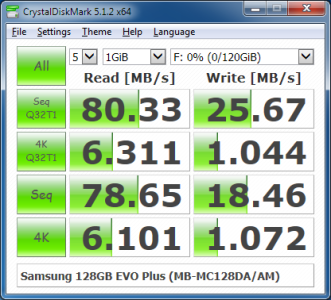Rixxo
Member
image shows it as 1 rating; it'll be super slow
Does the S7 even support the standard for the cards in the "best" list?
i read the same. That a standard old UHS/U1 card is enough, that S7/S7edge isn't going to take advantage of higher max speeds...
What about know?
5 cent. anyone?
My understanding is that UHS-II is a different physical port and requires more pin connections than what is in the S7/S7e.
I'm actually not sure if any device supports the UHS-II standard (would need to do more research).
For those that missed it, there's a related "news" article on the AC homepage.
My problem with all this discussion is that people aren't actually sticking the cards into the target phone and testing them before recommending them. Paying a premium for a better product is understandable, but "better" is very subjective. If the Galaxy S7 isn't going to take advantage of higher max speeds, why pay for them?
I have a Samsung 128 GB "Pro+" UHS/U3 card which should be among the fastest available (95MB/sec read, 90MB/sec write), but in the Galaxy S7, it benchmarks no faster than an old UHS/U1 card. On that basis, I'd suggest people save their money and buy a much less expensive UHS/U1 card of the same size.
The really Bad Thing here (in my opinion) is the AC article that actually suggests some of these microSD cards for use in the S7 without actually testing them. They even go so far as to list "transfer speeds" on some of the cards, which leads a reader to (wrongly) believe that the cards might see anything near such speeds in the S7. That's VERY misleading on the part of AC.
AC: Why not actually TEST these microSD cards before recommending them? It really wouldn't take long, and the testing data would make your article much more informative and useful to your readers.
im talking about UHS Speed Class 3 (U3) vs UHS Speed Class 1 (U1). Both in UHS-I and if we really can take advantage of the Class 3 (U3) speed on the S7.
Statement on the S7 sub-forum:




Headline sequential R/W speeds are NOT what's important. A lot of Lexar devices have high sequential rates but abysmal 4K random read/write speeds. Also, some Lexar UHS-II devices seriously underperform in UHS-I readers, e.g. dropping from 60MB/sec to 20MB/sec despite the reader being capable of 100MB/sec.Best & Fastest Micro SD Card :
if you know any with Faster speeds Please do post links
I would strongly recommend against the Lexar 1000x UHS-II 128GB card, as I've had repeated compatibility issues with this card and my SGS 7 (G930F, non-Edge).Lexar® Professional 1000x microSDHC™/microSDXC™ UHS-II Cards 128gb
read transfer speed up to 1000x (150MB/s)¹
This is the one card I would recommend as it's half the price of the Lexar 1000x in UK high street stores, AND faster when used in the S7/S7E. Under heavy random loads, the Sandisk 80MB/sec card is three times faster than the Lexar 150MB/sec card.SanDisk Ultra® micro SDHC™/micro SDXC™ UHS-I Card for Cameras 128gb
Read Speed: up to 80MB/S1
Does the S7 even support the standard for the cards in the "best" list?
What's the minimum read/write speeds I should be looking at getting if I want it to handle 4K?
I have the Patriot 256GB Supersonic Rage 2
So you can Imagine how fast it will be to transfer from SD to my Flash Drivewith OTG
Approx 80MB/sec read. That's with raw access to the underlying device (requires root shell), actual speeds via filesystem are about 10% lower. Write was 40MB/sec max, but that was via FS as I didn't have a blank card to do raw tests on. The UHS-I standard that the phone uses theoretically does 104MB/sec but 70-80MB/sec is the maximum you'll ever get in practice.But do we know how fast the card reader is in the phone. That was a issue with the Note3 in that the card reader in the phone limited access speed to the micro SD card when it was in the phone. I ran a benchmark on my 128GB card last night and only got about half it's rated speed for reads and writes.
Posted via the Android Central App
It'll be basically the same as the Lexar 1000x or Sandisk Ultra 533x cards: around 70MB/s read, 40MB/s write. Write is pretty rubbish, but at least it's better than the S4 which is limited to 15MB/sec due to the non-UHS SD 2.00 bus.Thanks Vader, however in your test the speed is limited by the microUSB 2.0 interface on the S7 to 42 MB/s.
Could you please test the Lexar 1800x microSD card in the S7 with the apps "A1 SD" and/or "Androbench" (for latter don't forget to select the correct test target, first) and report the numbers you'll get, here?
One more Testof the Lexar 1800x
image shows it as 1 rating; it'll be super slow
Correcti read the same. That a standard old UHS/U1 card is enough, that S7/S7edge isn't going to take advantage of higher max speeds...?
CorrectMy understanding is that UHS-II is a different physical port and requires more pin connections than what is in the S7/S7e.
Ahh I understand now. I don't have a U3 card so unfortunately I can't test them.
I´ve been recording some 4K videos and it seems to have a bitrate of about 6 MB/s, just don't know if it a fixed or variable bitrate during the recording...
So, why the need of top end cards with 60-70-80 MB/s of write?
what you guys think about this one?
Sandisk Ultra 128 GB which is 80MB read / 20M write - 63 euro
Also, some people reported that their sd cards got fried, and they were all sandisk...anyone heard about that?
Am getting my S7 Edge tomorrow. Any updated suggestions from those here? I see the last report was from last July. Thanks.
Headline sequential R/W speeds are NOT what's important. A lot of Lexar devices have high sequential rates but abysmal 4K random read/write speeds. Also, some Lexar UHS-II devices seriously underperform in UHS-I readers, e.g. dropping from 60MB/sec to 20MB/sec despite the reader being capable of 100MB/sec.
I would strongly recommend against the Lexar 1000x UHS-II 128GB card, as I've had repeated compatibility issues with this card and my SGS 7 (G930F, non-Edge).
This is the one card I would recommend as it's half the price of the Lexar 1000x in UK high street stores, AND faster when used in the S7/S7E. Under heavy random loads, the Sandisk 80MB/sec card is three times faster than the Lexar 150MB/sec card.
Nope. The S7 is a UHS-I only device.
6MB/sec. Which means any class 6, class 10 or UHS-1 card will do. The S7 records 4K at approximately 5.7MB/sec.
What, 10% of the speed you're paying for because phone is incapable of using more?
Approx 80MB/sec read. That's with raw access to the underlying device (requires root shell), actual speeds via filesystem are about 10% lower. Write was 40MB/sec max, but that was via FS as I didn't have a blank card to do raw tests on. The UHS-I standard that the phone uses theoretically does 104MB/sec but 70-80MB/sec is the maximum you'll ever get in practice.
It'll be basically the same as the Lexar 1000x or Sandisk Ultra 533x cards: around 70MB/s read, 40MB/s write. Write is pretty rubbish, but at least it's better than the S4 which is limited to 15MB/sec due to the non-UHS SD 2.00 bus.
Woohoo, same speed as a Sandisk 533x. What did I tell ya...
Wrong. My "1" rated card is as fast as the OP's Lexar 1800x. The rating simply means a minimum write speed of >10MB/sec, which is more than enough for 4K recording. Rating means nothing else in terms of performance.
Correct
The S7 can't even take advantage of UHS-I speeds, as it's a pretty crappy UHS-I reader.
Correct
Means very little tbh. A U1 card can easily do more than U3 speeds (I have a card that doesn't even have a U1 rating, yet does 35MB/sec.) The rating is a minimum, in practice most cards can do 2-3x more than their rating.
Well because as I said earlier, sequential speeds are very little of what makes a card "good" or feel "fast". Practically the only thing you do on a phone that relies solely on sequential speed is video recording, everything else is non-sequential. And a card that does 150MB/sec sequential might only do 0.01MB/sec non-sequential (yeah, I have one, it's a piece of ****). People need to look beyond the maximum headline speeds, they're good for marketing, and not much else.
I'd recommend it, especially now it's 40 euros and does 40M write.
Yes I've got SD cards that fried, I've fried a Sandisk card, I've fried a Kingston card, I've fried a Sony card, any card will fry eventually. You just hear more about Sandisk because they are common and more people have them.
As above, my recommendation goes to the Sandisk Ultra 80MB/s 128GB
SDSQUNC-128G-GN6MA
https://www.amazon.com/SanDisk-micr...ag=hawk-future-20&ascsubtag=UUacUvbUpU5607023
Buy SanDisk Ultra 80MBs MicroSD Memory Card - 128GB at Argos.co.uk - Your Online Shop for Memory cards, Memory cards and readers, Cameras and camcorders, Technology.
But really, there's not a huge amount of difference between any of the UHS-I cards.
The Samsung Evo Plus is faster than the SanDisk Ultra and Ultra Plus. The Ultra Plus in particular has poor random read speeds on Android.How does the Samsung Evo+ and Patriot LX series compare to the SanDisk Ultra Plus you are recommending? Thanks.
Thanks. That's good because I decided to get a 128gb Evo Plus. I am running a 64gb Lexar right now but, need some more space and figured I would get something faster at the same time.The Samsung Evo Plus is faster than the SanDisk Ultra and Ultra Plus. The Ultra Plus in particular has poor random read speeds on Android.
The Samsung Evo Plus is also faster than the Patriot LX, which also has slow random write speeds on Android.
Anyone try cards larger that 128? Looking to try 256?...any get that working?


